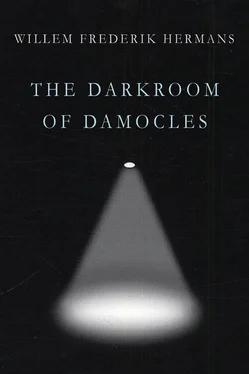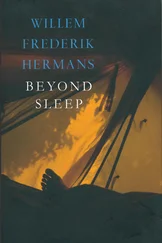‘What did I tell you?’ said Osewoudt. ‘Here it is: Dorbeck’s uniform. See the two pips on the collar? The crossed cannons? It’s the uniform of a first lieutenant in the artillery, just as I said. This is the uniform that belonged to Dorbeck. See for yourself. It’ll fit me, because Dorbeck and me were the same height.’
He snatched the jacket from the policeman and held it to his chest to show that it was his size. But the fabric was so far gone that the garment fell away in rags, and they had trouble collecting the buttons, which had rolled away.
This cell wasn’t really a cell. It was a good-sized space, if not high. It was half buried underground, so the only source of daylight was a double row of glass tiles just below the ceiling. An electric light covered with a griddle remained on all day. It wasn’t cold, because there were thick central heating pipes passing through it, but dank due to the absence of a window. An enamel bucket with a wooden lid stood in the corner.
Things could be worse, Osewoudt thought. From time to time cries and groans sounded overhead, where a large number of political prisoners were being held. He was relieved to be on his own.
It would not be long now, he told himself, before everything came out in the open, enough at any rate for them to let him go, regardless of whether Dorbeck ever showed his face again.
He got up and took a newspaper from the small table, on which all his worldly possessions were gathered. The newspaper was much smaller than normal — no bigger than a pre-war weekly. He knew everything in it off by heart. On page three was his own picture, captioned:
500-guilders reward for anyone able to provide information concerning the individual pictured above, going by the name of DORBECK, who was sighted repeatedly during the Occupation in various locales (Voorschoten, Amsterdam) passing himself off as an officer in the Dutch army.
A description of the wanted man followed, along with a list of official addresses where such information could be handed in.
A key turned in the lock, and Spuybroek stepped inside.
‘Still reading that newspaper? Well, you’d better come with me. Apparently somebody’s come forward at last with some information.’
Osewoudt stood up and coughed.
‘Put a scarf on,’ said Spuybroek. ‘The wind’s blowing from the potato-meal factory.’
Osewoudt pulled a faded but thick woollen scarf from the table and wound it around his neck.
‘Who is this person who’s come forward?’
‘An old man in a wheelchair. Spent a long time in a concentration camp.’
Osewoudt followed Spuybroek out of the cell. They went past the central-heating furnaces, and then through another basement area filled with rusty machinery. The building was an old milk factory that had been shut down in the early days of the German occupation. They went up a flight of crumbling concrete steps and out through a small door.
An expanse of cracked concrete sloped down to a canal. The water was fenced off with barbed wire. Across the water was the potato-meal factory, beside which rose a mountain of pale, rotting foam like beaten egg white, so poisonous that dumping it in the canal was prohibited. Black clouds hung low over the flat, bare countryside. It was raining steadily; the stone terrace was full of puddles.
Osewoudt was racked with coughing again, and stood still. He cast a nervous eye over his surroundings.
On the chimney of the factory the word COOPERATIVE was still legible in a column of faint white letters. Beyond the concrete yard there was a second expanse of concrete, divided from the first by a tall screen of barbed wire. A small factory producing flavouring extracts stood there. When the weather was fine there was usually a breeze from that direction, carrying the smell of vanilla.
‘I hope for your sake,’ said Spuybroek, ‘that we have a mild winter, otherwise you’ll have a hard time of it here in the peat-cutting district.’
‘I’ll be out by then, with any luck.’
Osewoudt put away his handkerchief.
‘Where will you go when you’re free?’
Osewoudt looked about him and saw the armed guards by the entrance, who had nothing better to do than follow his every move.
‘I wouldn’t know,’ he replied softly. ‘I’ve no one left in the world.’
They went into a building which, had it been surrounded by a garden, would have resembled a villa. Formerly home to the factory boss, it now served as the camp offices. Spuybroek handed a note to one of the Sten-wielding guards, and they went inside.
Spuybroek knocked on a door, poked his head in, then beckoned Osewoudt.
Osewoudt stepped inside. In the middle of the room stood a wheelchair, occupied by a man with long snowy hair. His head lolled on his chest; he seemed to be asleep. He wore a heavy black overcoat and had a rug tucked round his apparently lame legs. Beside him stood a woman, resting her hand on the back of the wheelchair. She wore a coat with a fur collar, and a nurse’s cap. She had purple, cracked cheeks and hard, beady eyes, like a hen. She eyed Osewoudt with scornful interest, then gave the old man’s shoulder a shake.
‘Mr Nauta, here he is.’
‘Uncle Bart! Is it really you?’
Osewoudt moved up close to the wheelchair.
The old man raised his head, but his chin stayed on his chest. White threads of saliva dripped on his coat, his pale tongue protruded over his bluish lower lip. He had a horrible scar at the left corner of his mouth.
He focussed his eyes on Osewoudt and said something, but he was unintelligible.
‘What did you say?’
‘Mr Nauta says he knows you.’
Inspector Selderhorst now stood up, took his chair and pushed the seat against the back of Osewoudt’s knees.
Once seated, Osewoudt was able to put his head close to his uncle’s, whose mouth emitted a vile smell, as if his entrails were rotting away.
‘Uncle Bart, I didn’t know you were still alive.’
Uncle Bart nodded and again tried to say something, but his lips barely moved. His voice was altered beyond recognition; the sounds he produced were more like grunts than words. Osewoudt had to strain to make out what he was saying.
‘Yes, everyone’s dead, but I’m still alive, Henri! I gave those Krauts a piece of my mind, so they tried to cut out my tongue. But I can still talk.’
‘Uncle Bart, do you remember that I came to your house one night with a girl called Elly Berkelbach Sprenkel?’
‘Yes, I remember that.’
‘Do you remember what I told you about her, later on?’
‘Henri, lad, I always knew you’d come to a bad end. I did everything I could for you.’
Selderhorst, too, rested his hand on the back of the wheelchair and bent low towards Uncle Bart’s ear.
‘Mr Nauta, nothing has been proved against your nephew as yet. We just have a couple of things we want to put straight.’
‘I never knew what the girl’s name was. He came to me with a girl after he left his wife. That’s all I remember, what does it matter, anyway?’
‘Why were you arrested by the Germans?’
‘I had a row with a German in the street.’
‘Didn’t they ask you about the girl? Didn’t they want to know whether she had stayed in your house?’
‘No. Oh, Henri, that it should have come to this! You, in this place! Your poor mother’s dead. My poor daughter’s dead, too. Murdered — and no one knows who did it! What a terrible world I’ve been living in. But there’s a better world in store. I’m a socialist in every fibre of my being, I will never lose my faith in humanity. My sacrifice has not been in vain. Sacrifices are never in vain. The time will come when there will be no more war. Peace, liberty and prosperity for all men. We now have an excellent government. Before long, everybody will be receiving old-age pensions — an ideal that was regarded as a fantasy when I was young. In the longer term there will be family allowances for everybody, and that, too, is a very fine thing. We ought to pay more attention to the good things in this world. Oh, Henri, you who are still so young — that you should have thrown away your future like this!’
Читать дальше












